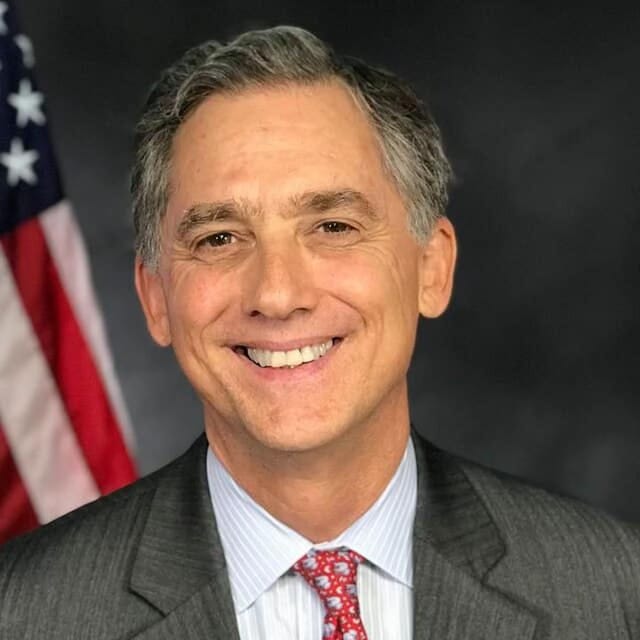House Financial Services Gets a Crypto-Friendly Chair 🎉
Arkansas Representative French Hill has deep ties to the crypto industry.
Hey! I’m Veronica Irwin, Unchained’s regulatory reporter.
More good news for crypto: Arkansas Republican French Hill will be the leader of the House Financial Services Committee.
This means that one of crypto’s strongest allies in Congress is in the position to kick-start stablecoin and market structure legislation next term (in fact, he promised to do so last summer). With Hill in control, it’s possible that crypto could have much of the regulatory clarity it’s asked for over the past several years by the end of 2025.
Crypto-Savvy Rep. French Hill Will Chair House Financial Services Committee
Hill is currently chair of the Subcommittee on Digital Assets, Financial Technology, and Inclusion.

Arkansas Republican Rep. French Hill will chair the House Financial Services Committee in the next Congressional session starting on Jan. 3, putting him in charge of a committee critical to passing crypto legislation focused on stablecoins and market structure, and also making him an important figure in the oversight of the US Securities and Exchange Commission (SEC). The vote was first announced by Punchbowl News on X.
Hill ran against Kentucky Rep. Andy Barr, Oklahoma Rep. Frank Lucas, and Michigan Rep. Bill Huizinga to replace North Carolina Rep. Patrick McHenry, who is retiring at the end of the current session. However, the race was primarily between Hill and Barr, with the other Representatives viewed as minor contenders weeks before the November election.
Why this Committee Matters
The House Financial Services committee works with the Senate Banking committee to oversee the SEC, which Trump nominated Paul Atkins to lead last week. It also works with the House and Senate Agriculture Committees, which together oversee the Commodities Futures Trading Commission (CFTC), to develop financial legislation around areas such as crypto market structure and stablecoin legislation before these bills go to a full House or Senate vote.
Read More: South Dakota Rep. Dusty Johnson Likely to Lead Digital Assets Subcommittee
"Rep. Hill is seen as a leader in the crypto space dating back to his days leading the first Fintech task force and more recently as the Digital Asset subcommittee Chair," explained Ron Hammond, Blockchain Association Director of Government Relations. "Rep. Hill is also a proven bridge builder in bringing Democrats into the fold for major legislative priorities to ensure crypto will not only remain bipartisan, but also top of the list in terms of priorities for the next Congress." The decision by the GOP steering committee to elevate Hill, who is currently the vice chair of the Financial Services Committee.
Hill’s Crypto Credentials
On the Unchained podcast in July, Hill, who chairs the Subcommittee on Digital Assets, Financial Technology, and Inclusion, made early promises that both a market structure bill and a stablecoin bill would be the first two pieces of legislation he would pass as chair. Market structure legislation would presumably determine whether cryptocurrencies are securities or commodities, while stablecoin legislation would set requirements for the amount and types of collateral that companies issuing such coins must keep in reserve.
Democrats and Republicans came close to reaching a compromise on stablecoin legislation in the House Financial Services Committee this year, while the Financial Innovation and Technology for the 21st Century Act (FIT21), which Hill co-wrote, passed with bipartisan support in the House but stalled in the Senate. The odds of either type of crypto legislation passing this session fell after Republicans gained seats in both chambers of Congress in the November election and some key GOP figures decided it would be better to wait to pass legislation requiring fewer compromises with Democrats next year.
Read More: Rep. French Hill Says He'd Investigate Operation Choke Point 2.0 as Financial Services Chair
In a letter circulated in November, Hill also promised to investigate how financial regulators were limiting the crypto industry’s ability to access banking services, a policy critics dubbed “Operation Choke Point 2.0.” Hill is known to be one of the more informed members of Congress on the technical aspects of cryptocurrency and the business models used, with strong connections to industry groups, business executives, and lobbyists. As a result, while both Hill and Barr are considered to be supportive of crypto, crypto policy advocates found Hill somewhat preferable.
Though there are politicians on both sides of the aisle eager to pass crypto legislation, it is expected that doing so will be easier under a Republican-controlled House and Senate given broader support for the industry in the GOP and a general orientation towards light-touch regulation. That said, Republicans will need at least six Democratic votes in the Senate to pass legislation, and may have chosen Hill for his ability to reach across the aisle, something he was better known for doing than Barr.
Related stories from Unchained:




